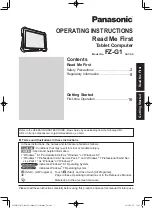
8
5.375 x 8.375 ver 2.3
❖
In any other environment where the risk of interference to other
devices, such as medical equipment or services is perceived or
identified as harmful.
If you are uncertain of the policy that applies on the use of wireless
devices in a specific organization or environment (e.g. airports), you
are encouraged to ask for authorization to use the Wireless LAN
device prior to turning on the equipment.
Exposure to Radio Frequency Radiation
The radiated output power of the Wireless LAN is far below
the FCC radio frequency exposure limits. Nevertheless, the
Wireless LAN shall be used in such a manner that the
potential for human contact during normal operation is
minimized. The antenna(s) used for this transmitter must not
be co-located or operating in conjunction with any other
antenna or transmitter.
Specific Absorption Rate (IEEE)
Your device is designed to be in compliance with Radio Waves exposure
regulations and does not exceed the limits for exposure to radio waves
(radio frequency electromagnetic fields) in accordance with the Federal
Communications Commission (FCC) and Industry Canada (IC). A
substantial safety margin is set to assure the safety of all persons,
regardless of health.
A unit of measurement known as the Specific Absorption rate, or SAR is
utilized for the radio wave exposure guidelines. The SAR measurement
for devices does not exceed 1.6W/kg.
The actual SAR values for your device, while in use, are normally well
below the stated values. The operating power of your device is
automatically decreased when full power is not needed for the wireless
connection to increase system efficiency and to minimize interference
on the network. The lower the power output of the device the lower its
SAR value.
As stated by the World Health Organization, present scientific
information indicates no special precautions are needed for the use of
this device. To further reduce any exposure, limit your usage.









































